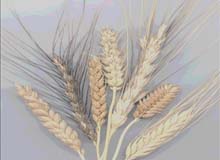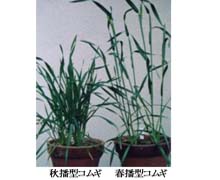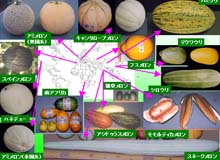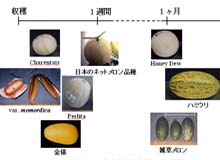Plant Genetics and Breeding
Molecular genetic study on diversity of crops and their wild relatives and its application to breeding
Staff
 | Prof. Dr. Hidetaka NISHIDA E-mail: hnishida (please add @okayama-u.ac.jp) Specialty: Plant breeding Studies on genetic diversity and agronomic traits in crop genetic resources including wheat, and development of DNA markers available for marker-assisted selection |
Research Topics
Genetic improvement of crops is crucial to achieving both food production coping with an explosive increase in world population and sustainable agriculture. Our research unit provides fundamental and applied studies and practical education on breeding and genetic improvement of crops. By using unique collections of wheat and melon genetic resources, we are trying to elucidate crop evolution and diversity, to exploit novel and agronomically useful genes by conducting molecular genetic analyses on agronomical traits, such as flowering-related traits of wheat including vernalization requirement and photoperiod sensitivity, as well as flower sex expression and disease resistance in melons.
Genetic studies on adaptation and diversification in wheat

The adaptation and diversification of wheat have been evaluated based on flowering-related traits and adaptably neutral genes such as complementary genes, and DNA markers in landraces and wild species collected from around the world. Genetic resources from China are one of the most interesting targets in this study, and fieldwork in and around China has been conducted several times. Further, we have been analyzing ancient DNA from wheat seeds excavated from ruins, which is beneficial for clarifying changes in adaptive genotypes at the same locations over time.
Molecular genetic studies on flowering-related genes in wheat and barley

Flowering time plays an important role in improving the adaptability of wheat and barley varieties. As part of a genetic study on the mechanism of flowering time, we are trying to identify and isolate genes controlling flowering-related traits, especially vernalization requirement and photoperiodic response.
Molecular genetic studies on variation, origin, and differentiation in melons

Two groups of melons—Group Conomon vars. makuwa and conomon endemic to eastern Asia—were believed to have been introduced into Japan in the Yayoi period. These melons were found to differentiate from the small seed-type melon of eastern India through molecular genetic analyses using isozymes and DNA markers. However, the origin of the eastern Indian melon remains unclear. Moreover, the basic origin of cultivated melons remains unclear. To solve these questions, diversity in the cytoplasmic genome has also been analyzed intensively.
Molecular genetic study on agronomic traits in melon

Diversity of post-harvest storage of melons
Novel assay systems have been developed and put into practical use for seed purity testing of F1 varieties and virus infection testing of seeds by using SSR markers and the RT-PCR method, respectively. We are now working on the following subjects: 1. exploitation of new genetic resources with disease resistance; 2. molecular genetic analyses of disease resistance, sex-expression of flower, and post-harvest storage of fruits; and 3. construction of a genetic map using DNA markers such as SSR.
Publications
・Mizuno N, Kinoshita M, Kinoshita S, Nishida H, Fujita M, Kato K, Murai K, Nasuda S:Loss-of-function mutations in three homoeologous PHYTOCLOCK 1 genes in common wheat are associated with the extra-early flowering phenotype. PLoS One, 11, e0165618 (2016)
・Tanaka K, Stevens C, Iwasaki S, Akashi Y, Yamamoto E, Dung TP, Nishida H, Fuller DQ and Kato K:Seed size and chloroplast DNA of modern and ancient seeds explain the establishment of Japanese cultivated melon by introduction and selection. Genet Resour Crop Evol, 63:1237-1254 (2016)
・Kippes N, Debernardi JM, Vasquez-Gross H, Akpinar BA, Hikmet B, Kato K, Chao S, Akhunov E and Dubcovsky J:Identification of the VERNALIZATION 4 gene reveals the origin of spring growth habit in ancient wheats from South Asia. Proc. Natl. Acad. Sci. U.S.A., 112, E5401-E5410 (2015)
・Kippes N, Zhu J, Chen A, Vanzetti L, Lukaszewski A, Nishida H, Kato K, Dvorak J and Dubcovsky J: Fine mapping and epistatic interactions of the vernalization gene VRN-D4 in hexaploid wheat. Mol. Genet. Genomics 289, 47-62 (2014)
・Nishida H, Ishihara D, Ishii M, Kaneko T, Kawahigashi H, Akashi Y, Saisho D, Tanaka K, Handa H, Takeda K and Kato K: Phytochrome C is a key factor controlling long-day flowering in barley (Hordeum vulgare L.). Plant Physiol. 163, 804-814 (2013)
・Nishida H, Yoshida T, Kawakami K, Fujita M, Long B, Akashi Y, Laurie DA and Kato K: Structural variation in 5’ upstream region of photoperiod-insensitive alleles Ppd-A1a and Ppd-B1a identified in hexaploid wheat (Triticum aestivum L.), and their effect on heading time. Mol. Breed. 31, 27-37 (2013)
・Tanaka K, Akashi Y, Fukunaga K, Yamamoto T, Aierken Y, Nishida H, Long CL, Yoshino H, Sato YI and Kato K: Diversification and genetic differentiation of cultivated melon inferred from sequence polymorphism in the chloroplast genome. Breed. Sci. 63, 183-196 (2013)
・Seki M, Chono M, Nishimura T, Sato M, Yoshimura Y, Matsunaka H, Fujita M, Oda S, Kubo K, Kiribuchi-Otobe C, Kojima H, Nishida H and Kato K: Distribution of photoperiod-insensitive allele Ppd-A1a and its effect on heading time in Japanese wheat cultivars. Breed. Sci. 63, 309-316 (2013)
・Okada T, Ridma JEA, Jayasinghe M, Eckermann P, Watson-Haigh NS, Warner P, Pallotta M, Hendrikse Y, Baes M, Tucker E, Laga H, Kato K, Albertsen M, Wolters P, Fleury D, Baumann U, Whitford R:Effects of Rht-B1 and Ppd-D1 loci on pollinator traits in wheat. Theor. Appl. Genet., 132, 1965-1979 (2019)
・Inoue Y, Vy TTP, Yoshida K, Asano H, Mitsuoka C, Asuke S, Anh VL, Cumagun CJR, Chuma I, Terauchi R, Kato K, Mitchell T, Valent B, Farman M, Tosa Y : Evolution of the wheat blast fungus through functional losses in a host specificity determinant. Science, 357, Issue 6346,80-83 (2017)